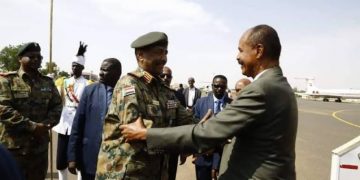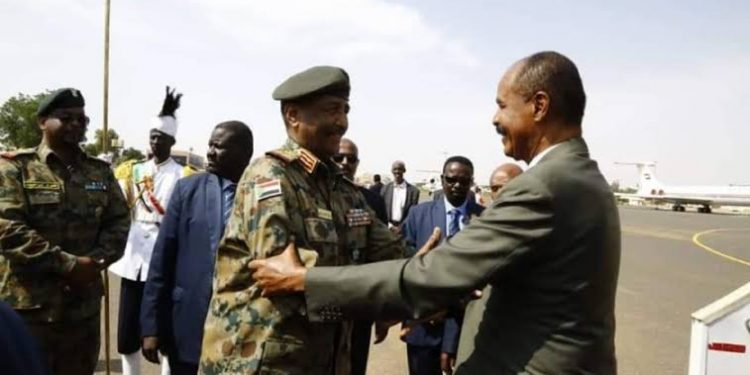Eritrea’s president Isaias Afwerki arrived in Khartoum on Tuesday for talks with Sudanese officials amid tensions over a longtime border dispute between Sudan and Ethiopia.
Accompanied by Foreign Minister Osman Saleh and presidential adviser Yemane Ghebreab, Isaias was received at the Sudanese capital’s international airport by General Abdel Fattah al-Burhan, head of Sudan’s ruling sovereign council.
The two-day visit comes after Sudan in February accused a third party of siding with Ethiopia in its border dispute with Sudan. It was likely referring to Eritrea which has deployed troops to the Tigray region to fight alongside Ethiopian federal forces in the conflict there.
According to a statement from the council, the two leaders held talks to discuss cooperation and the best ways of strengthening ties between their countries.
Eritrea’s information ministry said in a separate statement that Isaias and al-Burhan had “agreed to strengthen their efforts in the implementation of the Agreement of Cooperation reached between the two countries in the political, economic, social, security, and military sectors”.
Sudan and Ethiopia have since held rounds of talks to try and settle the dispute, most recently in Khartoum in December, but have not made progress.
Khartoum has said its forces have reclaimed most of its territory. But it has called on Ethiopia to withdraw troops from at least two points it says are inside Sudan under an agreement that demarcated the borders between the two nations in the early 1900s.
Ethiopia, however, accused Sudan of taking advantage of the deadly conflict in Tigray to enter Ethiopian territory and loot property, kill civilians and displace thousands of people. The Tigray fighting has sent over 70,000 Ethiopia refugees into Sudan.
The visit also comes as Afwerki faces growing pressure from the international community, including the U.S., to withdrew Eritrean troops from Tigray.
Soldiers from Eritrea, long an enemy of Tigray’s now-fugitive leaders, have also been blamed for some of the worst human rights abuses in the Tigray conflict.




































